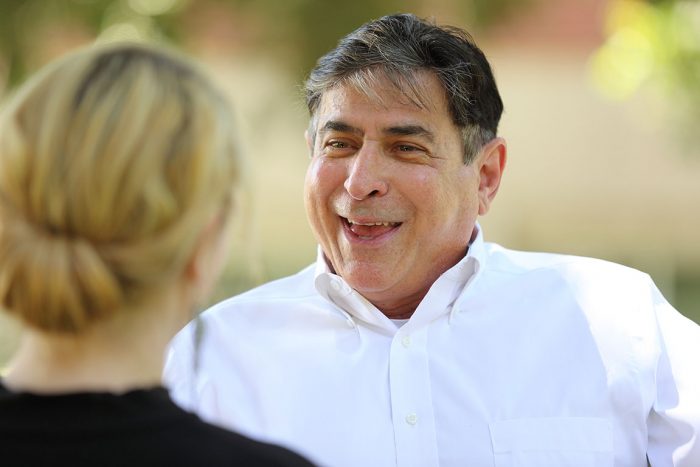Eric Schockman on ‘Inclusive Leadership’ and the Zero-Sum Game
 A public policy expert, H. Eric Schockman is associate professor, chair of the Leadership Department and director of the Center for Leadership in the College of Liberal Arts. Prof. Schockman joined with co-editors Aldo Boitano, executive director of executive development at the International Leadership Association, and Raúl Lagomarsino Dutra from the ESE Business School, Universidad de Los Andes, both of Santiago, Chile, to compile “Breaking the Zero-Sum Game: Transforming Societies through Inclusive Leadership” (Emerald Publishing, UK, 2017). Below, Prof. Schockman discusses the impetus behind the book and the themes it encompasses.
A public policy expert, H. Eric Schockman is associate professor, chair of the Leadership Department and director of the Center for Leadership in the College of Liberal Arts. Prof. Schockman joined with co-editors Aldo Boitano, executive director of executive development at the International Leadership Association, and Raúl Lagomarsino Dutra from the ESE Business School, Universidad de Los Andes, both of Santiago, Chile, to compile “Breaking the Zero-Sum Game: Transforming Societies through Inclusive Leadership” (Emerald Publishing, UK, 2017). Below, Prof. Schockman discusses the impetus behind the book and the themes it encompasses.
Q: Tell us about the genesis of the book, your co-editors, and how you came to work together.
Prof. Schockman: The book is a true collaboration, reflecting the collective vision of my co-editors – both of whom are scholars and practitioners in Santiago, Chile — the publisher Emerald Press, and the International Leadership Association. We had all thought deeply about the world as we saw it, and the text grew out of our conversations. We realized that we shared the same worldview, as we witnessed the disintegration of the nation-state, the disaggregation of societies, and the coming apart of the social fabric, across various cultures. At the same time, we looked hopefully at other signs, developments like the Arab Spring and Occupy Wall Street. These things symbolized to us both negative and positive forces happening around the world. We put out a call for papers. Our question was simple: how do you make an inclusive society? Throughout, we wanted to focus on the positive.
Q: How long was this project, from start to completion?
Prof. Schockman: A year and a half. We started before the election. One of the chapters compares the [inclusive] leadership styles of presidential candidate Donald Trump, Pope Francis, German chancellor Angela Merkel, and former New Zealand prime minister Helen Clark. That chapter proved to be a precursor to the Trump presidency.
Q: How do you define inclusive leadership, and how is that connected to the concept of the zero-sum game?
Prof. Schockman: “Inclusive leadership” is a concept that’s been around for a while. It has many manifestations; our working definition involves its use within an organizational framework. Inclusive organizations not only involve a diversity of individuals, but more important, they’re learning-centered entities that value everyone’s contributions. They incorporate the needs and perspectives of employees or others involved in the organization.
An inclusive leader would be that individual who intentionally recruits and retains diverse staff to reflect the racial/ethnic community that the organization serves. Practicing inclusive leadership means being authentic. We see the zero-sum game, by contrast, as a sort of metaphor for a non-inclusive world where a win/lose situation prevails.
Q: Is it fair to say that the zero-sum concept is sort of the flipside, if you will, of inclusive leadership?
Prof. Schockman: Yes, exactly. It has the practicality of a global view, as we developed in the book.
Q: What are the top takeaways for readers?
Prof. Schockman: That practicing intentional inclusiveness as a leader brings better results and better decisions within an organization. And that inclusive leadership is not just about the leader. Edwin Hollander, the father of inclusive leadership, favors a less leader-centric understanding of the concept, which means you have to look at “followship.” Followship is amorphous terminology, but it does have stamina when you look at the empirical and theoretical chapters in the book.
Q: Who should read the book?
Prof. Schockman: It’s a crossover book in many ways, occupying a middle ground where leaders and followers meet. It’s a textbook, but it’s more than a textbook. It’s not geared only for a scholarly theoretical community, which of course we still want. It’s not just for university librarians. It is foremost a handbook for practitioners — people leading non-government organizations, people doing grassroots work, people who are CEOs and university presidents who want to get more productivity, more collective decision-making, more ownership. It’s not just top down, and it’s not just bottom up.
Q: In the tussle between zero-sum and win/win, which is prevailing right now?
Prof. Schockman: What brought us to this book, and what is most provocative about it, is this notion of how you want to look at the glass. The glass is very murky; is it half full or half empty? And if you look at the half-emptiness, you clearly see the rise of nativist nationalism and the disintegration of supra-national organizations like the EU and the creation of Brexit. That’s the zero-sum. You could even take the new tax law. It’s not about win/win; it’s about winners and losers. It’s about, “I want my estate tax repealed, I want my goodies and I don’t want to pay into the common trough.“ We are living today in this sort of topsy-turvy, glass half-empty or half-full world.
Inclusive leadership is not just about producing the pie. It’s about producing more of the pie, and about what’s preventing the growth of the fuller pie. Inclusive leaders manifest a whole different genre of tactics to get people to buy in, to work harder, to produce more, and to obtain a deeper understanding of conflicts and how to resolve them.